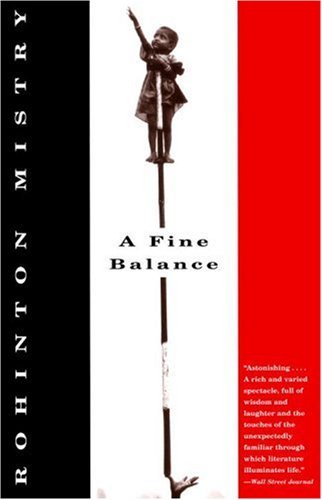I picked another hefty Booker contender for my next read. A Fine Balance by Rohinton Mistry.

It took a while for the cover picture to resolve itself into its separate parts. That's the whole book in so many ways - the balance between hope and despair, between protecting one's self and sheltering others. The balance between protection and exploitation. I'm intentionally not going into detail here, because it's better to read it not knowing much going in.
One of the best parts of this book is the writing. It's a very well-written book, but it's not arty or overdone. The story is the point, and that's the focus.
We follow four people, each with painful histories, who slowly forge a family in horrific circumstances. You hope that their lives will get better, or at least less precarious, as the book moves forward, but that doesn't happen in any kind of way that makes you feel better for them.
One of the four has a very different fate than the others, and the reason for it is one of the big questions the book asks. This story also shows how a breakdown in the protection of basic human rights victimizes nearly everyone. Character A steps on the back of Character B to avoid being crushed by Character C. And then there's the appalling but very human Beggarmaster. One of the most complex characters I have come across in a long time.
I'll be honest, I nearly stopped reading several times. I empathized to such a degree that I could hardly bear to keep going.
The extreme fragility of living in poverty will stay with you long after you put the book down.
But. I finished it, and it's beyond rewarding.
Final call:
You need a good dose of emotional fortitude to make it through A Fine Balance, but please do.
One of the best parts of this book is the writing. It's a very well-written book, but it's not arty or overdone. The story is the point, and that's the focus.
We follow four people, each with painful histories, who slowly forge a family in horrific circumstances. You hope that their lives will get better, or at least less precarious, as the book moves forward, but that doesn't happen in any kind of way that makes you feel better for them.
One of the four has a very different fate than the others, and the reason for it is one of the big questions the book asks. This story also shows how a breakdown in the protection of basic human rights victimizes nearly everyone. Character A steps on the back of Character B to avoid being crushed by Character C. And then there's the appalling but very human Beggarmaster. One of the most complex characters I have come across in a long time.
I'll be honest, I nearly stopped reading several times. I empathized to such a degree that I could hardly bear to keep going.
The extreme fragility of living in poverty will stay with you long after you put the book down.
But. I finished it, and it's beyond rewarding.
Final call:
You need a good dose of emotional fortitude to make it through A Fine Balance, but please do.
+(2).png)















+(2).png)

.png)
.png)